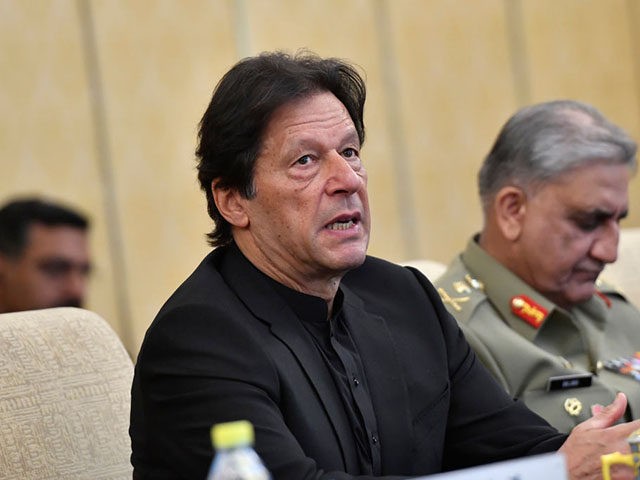Concerns have grown in Pakistan about growing public distrust in coronavirus vaccines after Prime Minister Imran Khan revealed this weekend that he tested positive for Chinese coronavirus, two days after receiving his first dose of the made-in-China coronavirus vaccine candidate by Sinopharm.
Khan had received his first dose of the Sinopharm vaccine candidate, the only one currently available in Pakistan, on Thursday. Photographing the occasion and using his personal experience to encourage Pakistani citizens to get vaccinated against the virus.
On Saturday, Islamabad confirmed Khan and wife Bushra Bibi had tested positive for Chinese coronavirus. The country’s Health Ministry was quick to insist that Sinopharm’s product takes more than one dose and more than two days to provide the protection against the virus promised and that Khan’s condition was not an indictment of the vaccine candidate’s effectiveness.
“Prime Minister Imran Khan was not fully vaccinated when he contracted the virus. He only got the 1st dose and merely 2 days ago which is too soon for ANY vaccine to become effective,” the Ministry of National Health Services said in a statement posted on Twitter with the hashtag #VaccinesWork. “Anti-bodies develop 2-3 weeks after 2nd dose of 2-dose COVID [Chinese coronavirus] vaccines.”
Faisal Sultan, the doctor treating the prime minister and first lady, insisted at a press briefing that the vaccine takes time to work and it was possible that Khan was already infected before he received the vaccine. He encouraged Pakistanis to participate in the nation’s vaccine drive, which began on March 10.
“The positivity rate has doubled in the past week. In some cities, it has crossed ten [percent]. So follow precautionary measures, stay at home when possible, use face masks, maintain a distance of six feet from each other, refrain from visiting crowded places and regularly wash/sanitize your hands,” Sultan urged.
As of Tuesday, Pakistan has documented 633,741 cases of Chinese coronavirus and nearly 14,000 deaths, though many observers suggest that the rate of infection may be significantly higher given the nation’s inability to offer testing in many rural, impoverished, or otherwise underdeveloped areas.
Khan has attempted to mitigate the spread of the virus by urging citizens to engage in social distance, wear sanitary masks, and avoid crowds. The advice has not prevented the organization of mass events such as political opposition rallies and Islamist mob protests. One such protest preceded the death of one of its organizers, Khadim Hussain Rizvi of the radical Islamist group Tehreek-i-Labbaik Pakistan (TLP), who died with a fever and respiratory symptoms but was reportedly not counted as a coronavirus death. His funeral in November attracted hundreds of thousands of people.
Pakistanis have expressed significant concerns with receiving vaccination products when asked by pollsters. A survey published in March by Ipsos found nearly 40 percent of Pakistanis would not get a vaccine if it became readily available to them, one of the lowest rates of demand for a coronavirus vaccine in the world. Of those who said they would not get the vaccine, 21 percent said they were “against vaccines in general,” the highest rate among the 15 countries Ipsos polled. Among all Pakistanis, 97 percent could not name a single vaccine or vaccine candidate approved for coronavirus anywhere in the world.
Pakistan’s President Arif Alvi defended vaccination in a message posted to Twitter and carried by Chinese state media, which has a vested interested in defending Chinese inoculation products.
“[Chinese coronavirus] vaccination is a must. It is given in two doses [and] takes a few weeks to become effective,” Alvi wrote. “In most cases it is 100% effective [and] in remaining, severity of infection is greatly reduced which increases survival rate.”
In reality, studies have shown that the Sinopharm product is far from 100-percent effective. While more effective than the first vaccine candidate approved in China — by the firm Sinovac, found the be only 50.38-percent effective in preventing infections — Sinopharm’s product cleared Phase III clinical trials at a 72.51-percent efficacy rate, according to Chinese sources. In contrast, two of America’s three approved coronavirus vaccines tested at upwards of 90-percent efficacy: the Pfizer vaccine at 95 percent and the Moderna vaccine at 94.1 percent. Chinese scientists have insisted both Chinese products are worth mass distribution because they have much higher rates of success in preventing hospitalizations due to coronavirus infections and deaths, meaning even those who ultimately become infected are far less likely to suffer severe medical consequences.
“The vaccine was able to 100 percent prevent severe illness in such a high-risk population, and effectively control the morbidity, and protect at least 50% of people from infection, which is good enough,” a Chinese government-approved infectious disease expert said of the Sinovac product in January.
Sinopharm’s parent company, Shanghai Fosun Pharmaceutical Group, announced in December that, despite having developed its own vaccine candidate, it would purchase 100 million doses of the coronavirus vaccine developed by American company Pfizer.

COMMENTS
Please let us know if you're having issues with commenting.